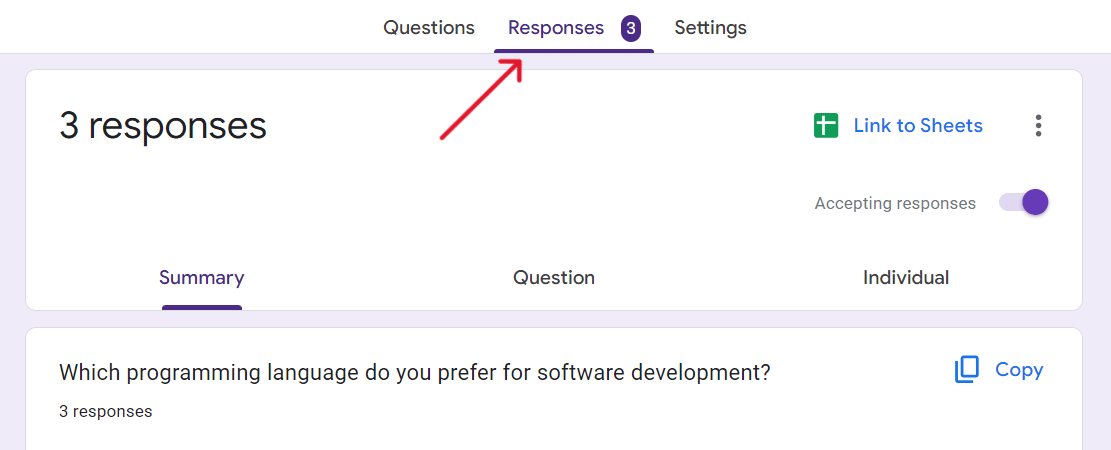How to Convert Google Forms Responses to PDF (4 Ways)
Fast navigation
- Step 1: Create or Select Your Form//
- Step 2: Go to Responses//
- Step 3: Convert Responses to PDF (4 Methods)//
- Method 1: Convert All Responses//
- Method 2: Convert Individual Responses//
- Method 3: Convert The Full Form//
- Method 4: Convert The Summary of Responses//
- Customize Your PDF//
- Enhance PDF with advanced features//
- Troubleshooting Common Pitfalls//
- Automating PDF Generation from Google Forms//
- Managing Large Scale PDF Exports Efficiently
We will show you 4 different methods of how to convert Google Forms responses to PDF.
This will enable anyone to transform their collected data into neatly organized, shareable PDF documents.
Our approach makes converting Google Forms to PDFs simple, enabling easy sharing of insights and feedback in a professional format.
Let’s dive in!
Steps:
- Create or Select Your Form
- Access Responses
- Convert Responses to PDF (4 Methods)
Step 1: Create or Select Your Form
If you haven’t created a Google Form yet and not collected any responses, then do that by going to Google Forms. Or choose an existing form filled with the responses you want to convert into a PDF:
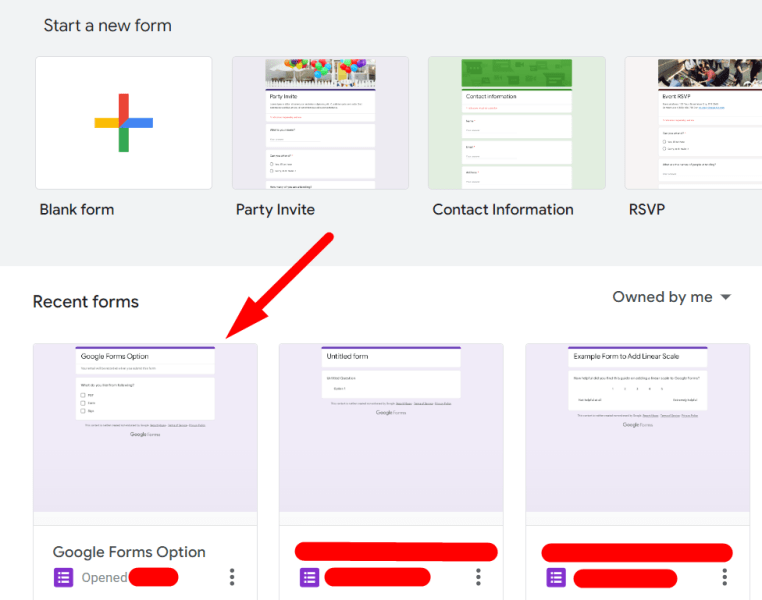
Step 2: Go to Responses
Step 3: Convert Responses to PDF (4 Methods)
Method 1: Convert All Responses
In the responses tab, click on the three dots right beside the Google Sheet “Link to Sheets” icon.
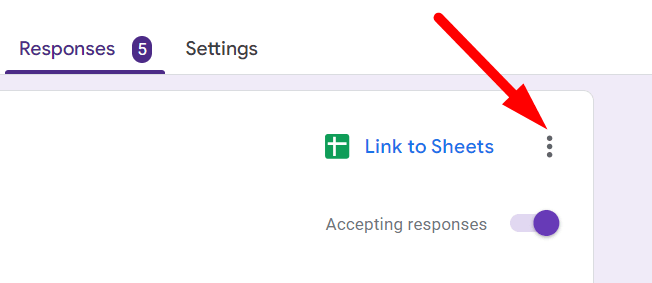
Choose "Print all responses,":
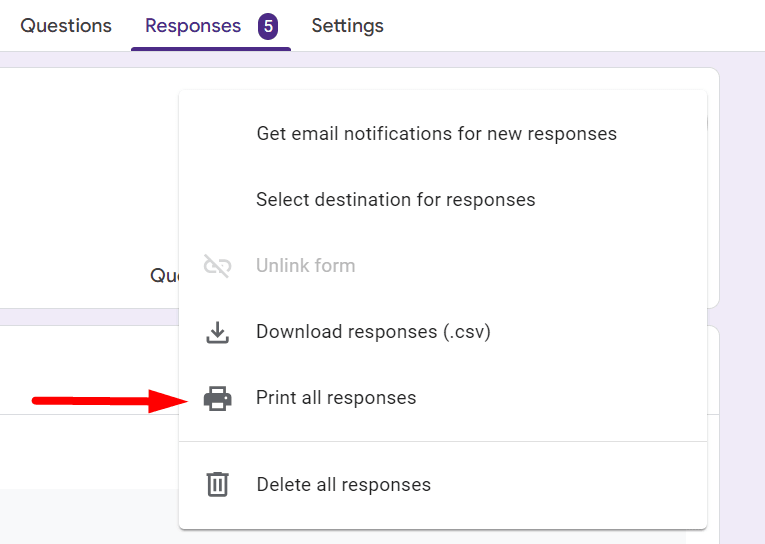
Then save as PDF in the print dialog.
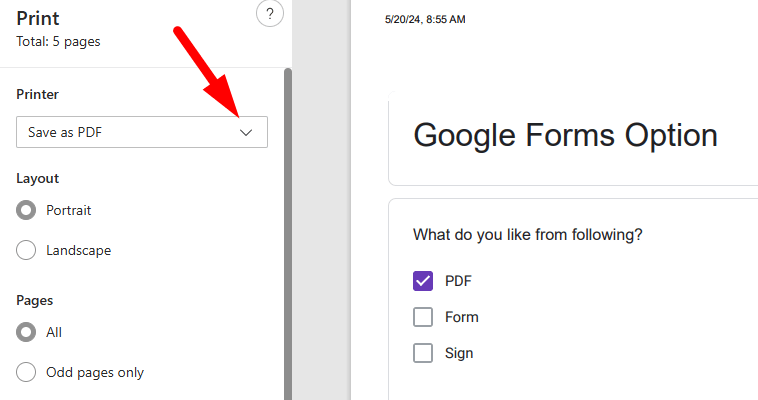
Notice where you receive the form in your pc.
Troubleshooting Tip: If the formatting appears misaligned in the PDF preview, adjust the scale or margins within the print dialog to ensure the content fits perfectly on the page.
Method 2: Convert Individual Responses
To convert individual responses, go to the “Individual” tab within the “Responses” tab.
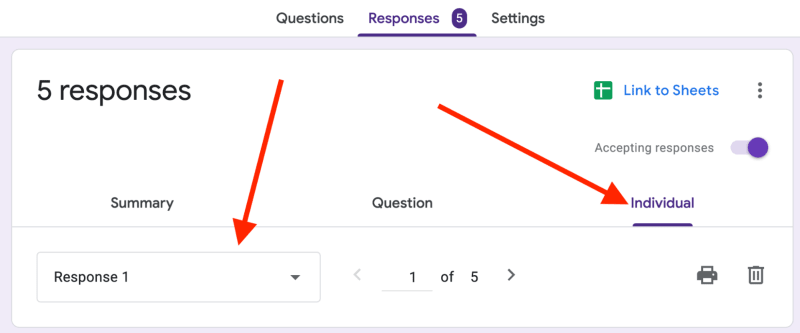
Select the response you wish to convert:
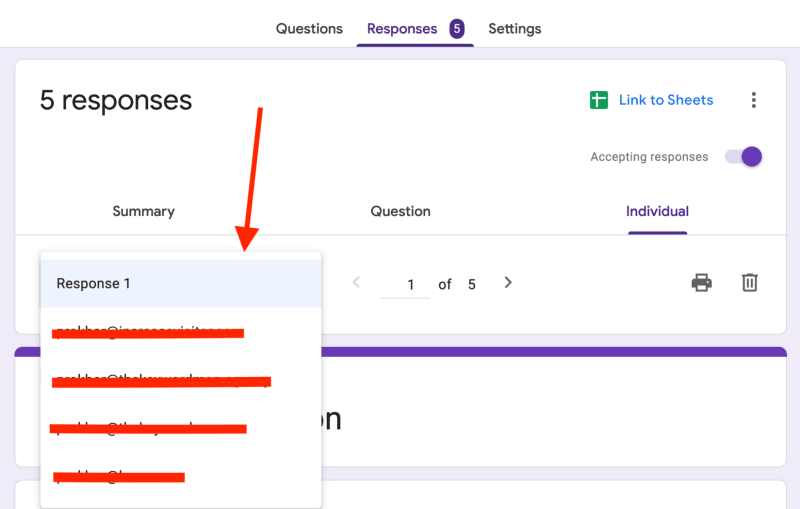
click the printer icon, and save as PDF.
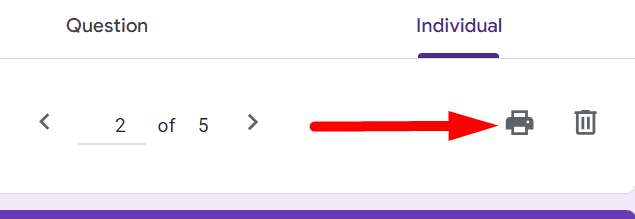
Method 3: Convert The Full Form
If you need to distribute paper copies of your Google Form, perhaps for audiences who prefer not traditional online formats—like students or attendees of a workshop—you can convert the entire form into a PDF.
This makes it easy to print and hand out as needed. To convert the full form into a PDF, follow these steps:
1. Start by either creating a new form in Google Forms or selecting an existing one.
2. Add any necessary questions and adjust your settings as desired.
3. To save your form as a PDF, click on the vertical ellipsis '⋮' (More) in the upper right corner and select 'Print', or simply press CTRL/Command + P.
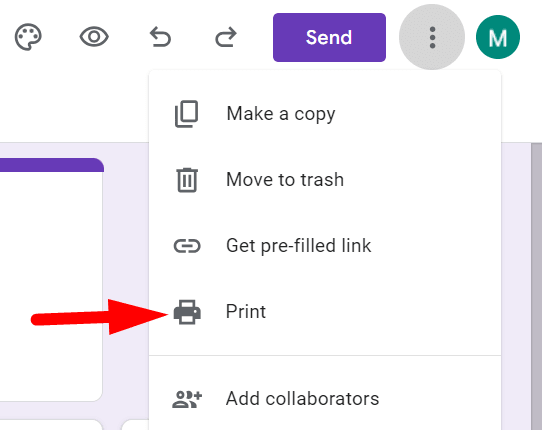
4. In the print options, most browsers will offer a 'Print to PDF' or 'Save as PDF' choice. Select 'Save as PDF' if it's not automatically chosen.
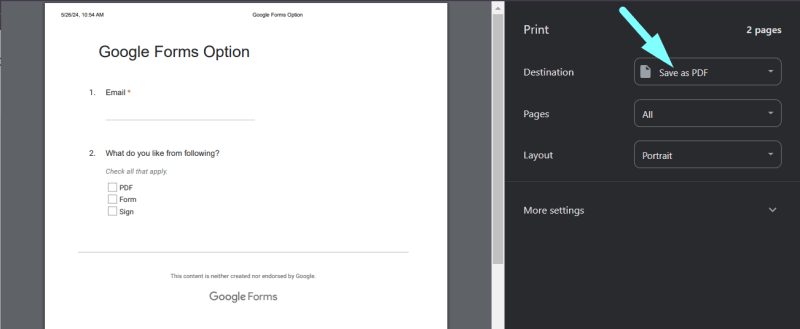
5. Click 'Save' to generate your PDF document, which you can then distribute digitally or print for physical distribution.
6. Alternatively, you can print the form directly without first saving it as a PDF.
Method 4: Convert The Summary of Responses
Google Forms provides a convenient summary view that aggregates all responses to each question, displaying them in an easy-to-understand graph format. This summary is perfect for capturing quick insights and can be seamlessly integrated into documents or presentations.
To convert this summary into a PDF, follow these steps:
1. Navigate to the 'Responses' tab in your Google Form and select the 'Summary' sub-tab to view the graphical overview.
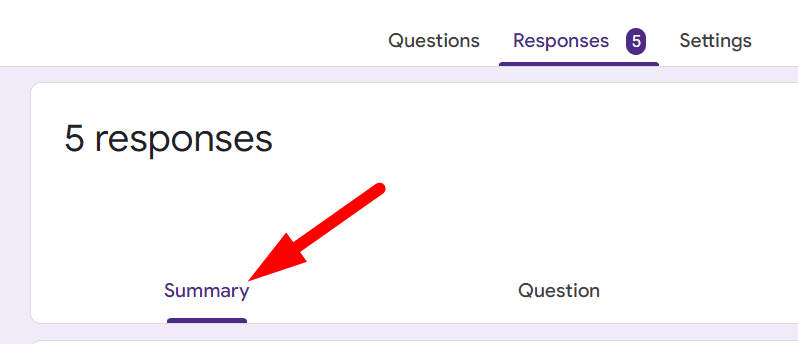
2. To begin the conversion process, press CTRL/Command + P. This will open a preview tab showing the summary.
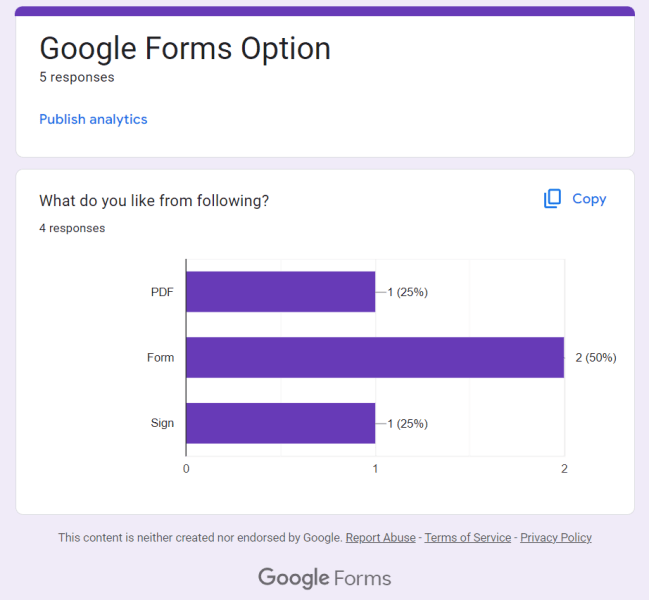
3. Press CTRL/Command + P again while in the preview tab to open the print dialog.
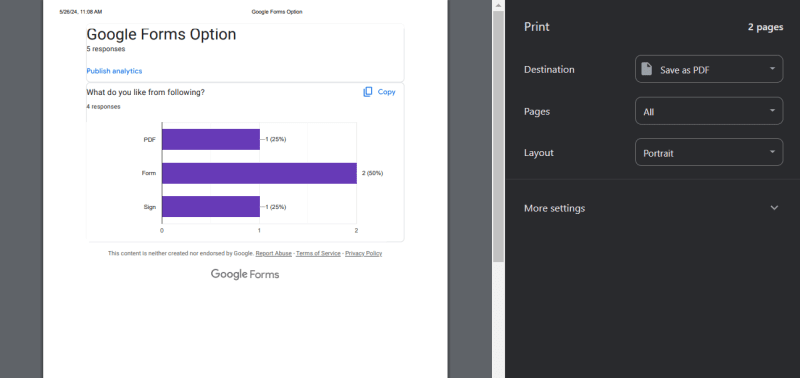
4. From here, you can either choose to 'Save as PDF' to create a digital file or select the print option to get a physical copy.
Finished!
Customize Your PDF
Before finalizing your PDF, consider customizing its appearance for better readability or to align with your organization's branding.
Layout and Design Customization: In the print dialog, explore settings, such as layout orientation (portrait or landscape):
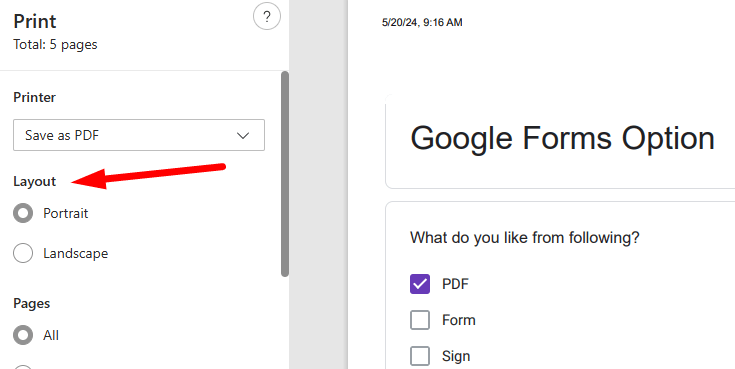
And margins:
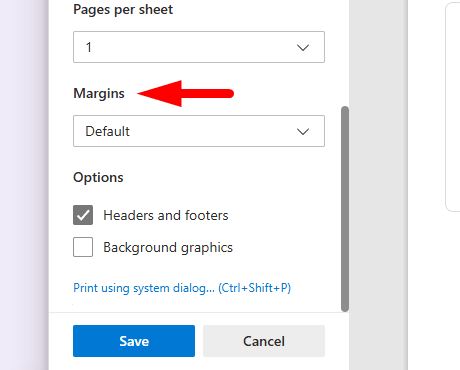
Adjust these settings to enhance the presentation of your PDF document.
Custom Formatting Tips: Add headers or footers in your PDF document for a professional touch, such as including the form's title, page numbers, or your organization's contact information.
Enhance PDF with advanced features
After conversion, further enhance your PDF with advanced features using PDF editing software:
- Electronic Signatures: Add signature fields if your PDF requires acknowledgment or approval.
- Encrypt Documents: Secure sensitive data by encrypting your PDF files.
- Fillable Form Fields: For interactive documents, incorporate fillable fields that recipients can complete in the PDF version.
Troubleshooting Common Pitfalls
Encountering issues? Here are fixes to common problems:
- Formatting Errors: Ensure your browser's print-to-PDF settings are correctly configured to prevent cut-off text or misaligned layouts.
- Large Response Volumes: For forms with extensive responses, consider segmenting the data into multiple PDFs to avoid overwhelming single documents.
Automating PDF Generation from Google Forms
Automating the conversion of Google Forms responses into PDFs will definitely make your workflow better.
By integrating Google Forms with automation tools like Zapier or Google Scripts, you can set up triggers that automatically generate PDFs upon form submission.
This not only saves time but also ensures that your data management process is seamless and error-free, allowing you to focus on analysis and action.
Managing Large Scale PDF Exports Efficiently
Handling a high volume of PDF exports demands a strategic approach. For those dealing with extensive datasets, utilizing cloud storage solutions like Google Drive alongside Google Sheets can optimize the process.
By automatically syncing form responses to Sheets and then batch exporting them to PDFs, you can manage large-scale exports with precision.
This method offers a structured way to organize, access, and share your PDFs, making the management of bulky data sets a breeze.
We hope we helped you to convert Google Forms responses to PDF.
